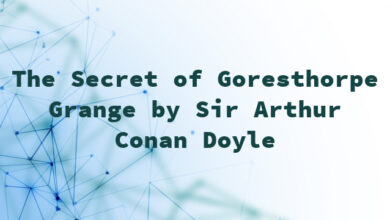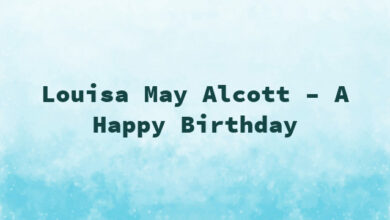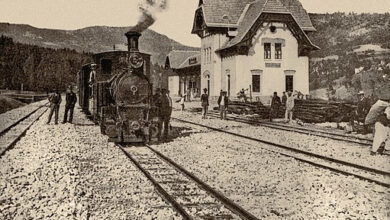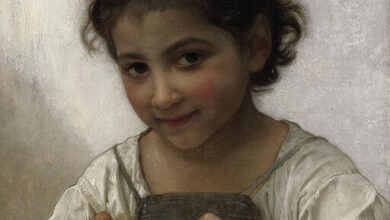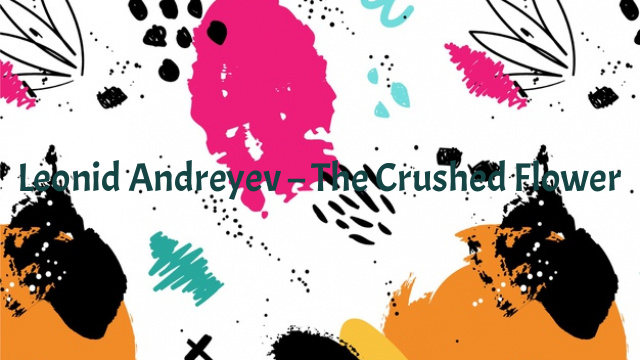
Leonid Andreyev – The Crushed Flower
CHAPTER I
His name was Yura.
He was six years old, and the world was to him enormous, alive and bewitchingly mysterious. He knew the sky quite well. He knew its deep azure by day, and the white-breasted, half silvery, half golden clouds slowly floating by. He often watched them as he lay on his back upon the grass or upon the roof. But he did not know the stars so well, for he went to bed early. He knew well and remembered only one star–the green, bright and very attentive star that rises in the pale sky just before you go to bed, and that seemed to be the only star so large in the whole sky.
But best of all, he knew the earth in the yard, in the street and in the garden, with all its inexhaustible wealth of stones, of velvety grass, of hot sand and of that wonderfully varied, mysterious and delightful dust which grown people did not notice at all from the height of their enormous size. And in falling asleep, as the last bright image of the passing day, he took along to his dreams a bit of hot, rubbed off stone bathed in sunshine or a thick layer of tenderly tickling, burning dust.
When he went with his mother to the centre of the city along the large streets, he remembered best of all, upon his return, the wide, flat stones upon which his steps and his feet seemed terribly small, like two little boats. And even the multitude of revolving wheels and horses’ heads did not impress themselves so clearly upon his memory as this new and unusually interesting appearance of the ground.
Everything was enormous to him–the fences, the dogs and the people– but that did not at all surprise or frighten him; that only made everything particularly interesting; that transformed life into an uninterrupted miracle. According to his measures, various objects seemed to him as follows:
His father–ten yards tall.
His mother–three yards.
The neighbour’s angry dog–thirty yards.
Their own dog–ten yards, like papa.
Their house of one story was very, very tall–a mile.
The distance between one side of the street and the other–two miles.
Their garden and the trees in their garden seemed immense, infinitely tall.
The city–a million–just how much he did not know.
And everything else appeared to him in the same way. He knew many people, large and small, but he knew and appreciated better the little ones with whom he could speak of everything. The grown people behaved so foolishly and asked such absurd, dull questions about things that everybody knew, that it was necessary for him also to make believe that he was foolish. He had to lisp and give nonsensical answers; and, of course, he felt like running away from them as soon as possible. But there were over him and around him and within him two entirely extraordinary persons, at once big and small, wise and foolish, at once his own and strangers–his father and mother.
They must have been very good people, otherwise they could not have been his father and mother; at any rate, they were charming and unlike other people. He could say with certainty that his father was very great, terribly wise, that he possessed immense power, which made him a person to be feared somewhat, and it was interesting to talk with him about unusual things, placing his hand in father’s large, strong, warm hand for safety’s sake.
Mamma was not so large, and sometimes she was even very small; she was very kind hearted, she kissed tenderly; she understood very well how he felt when he had a pain in his little stomach, and only with her could he relieve his heart when he grew tired of life, of his games or when he was the victim of some cruel injustice. And if it was unpleasant to cry in father’s presence, and even dangerous to be capricious, his tears had an unusually pleasant taste in mother’s presence and filled his soul with a peculiar serene sadness, which he could find neither in his games nor in laughter, nor even in the reading of the most terrible fairy tales.
It should be added that mamma was a beautiful woman and that everybody was in love with her. That was good, for he felt proud of it, but that was also bad–for he feared that she might be taken away. And every time one of the men, one of those enormous, invariably inimical men who were busy with themselves, looked at mamma fixedly for a long time, Yura felt bored and uneasy. He felt like stationing himself between him and mamma, and no matter where he went to attend to his own affairs, something was drawing him back.
Sometimes mamma would utter a bad, terrifying phrase:
“Why are you forever staying around here? Go and play in your own room.”
There was nothing left for him to do but to go away. He would take a book along or he would sit down to draw, but that did not always help him. Sometimes mamma would praise him for reading but sometimes she would say again:
“You had better go to your own room, Yurochka. You see, you’ve spilt water on the tablecloth again; you always do some mischief with your drawing.”
And then she would reproach him for being perverse. But he felt worst of all when a dangerous and suspicious guest would come when Yura had to go to bed. But when he lay down in his bed a sense of easiness came over him and he felt as though all was ended; the lights went out, life stopped; everything slept.
In all such cases with suspicious men Yura felt vaguely but very strongly that he was replacing father in some way. And that made him somewhat like a grown man–he was in a bad frame of mind, like a grown person, but, therefore, he was unusually calculating, wise and serious. Of course, he said nothing about this to any one, for no one would understand him; but, by the manner in which he caressed father when he arrived and sat down on his knees patronisingly, one could see in the boy a man who fulfilled his duty to the end. At times father could not understand him and would simply send him away to play or to sleep–Yura never felt offended and went away with a feeling of great satisfaction. He did not feel the need of being understood; he even feared it. At times he would not tell under any circumstances why he was crying; at times he would make believe that he was absent minded, that he heard nothing, that he was occupied with his own affairs, but he heard and understood.
And he had a terrible secret. He had noticed that these extraordinary and charming people, father and mother, were sometimes unhappy and were hiding this from everybody. Therefore he was also concealing his discovery, and gave everybody the impression that all was well. Many times he found mamma crying somewhere in a corner in the drawing room, or in the bedroom–his own room was next to her bedroom–and one night, very late, almost at dawn, he heard the terribly loud and angry voice of father and the weeping voice of mother. He lay a long time, holding his breath, but then he was so terrified by that unusual conversation in the middle of the night that he could not restrain himself and he asked his nurse in a soft voice:
“What are they saying?”
And the nurse answered quickly in a whisper:
“Sleep, sleep. They are not saying anything.”
“I am coming over to your bed.”
“Aren’t you ashamed of yourself? Such a big boy!”
“I am coming over to your bed.”
Thus, terribly afraid lest they should be heard, they spoke in whispers and argued in the dark; and the end was that Yura moved over to nurse’s bed, upon her rough, but cosy and warm blanket.
In the morning papa and mamma were very cheerful and Yura pretended that he believed them and it seemed that he really did believe them. But that same evening, and perhaps it was another evening, he noticed his father crying. It happened in the following way: He was passing his father’s study, and the door was half open; he heard a noise and he looked in quietly–father lay face downward upon his couch and cried aloud. There was no one else in the room. Yura went away, turned about in his room and came back–the door was still half open, no one but father was in the room, and he was still sobbing. If he cried quietly, Yura could understand it, but he sobbed loudly, he moaned in a heavy voice and his teeth were gnashing terribly. He lay there, covering the entire couch, hiding his head under his broad shoulders, sniffing heavily–and that was beyond his understanding. And on the table, on the large table covered with pencils, papers and a wealth of other things, stood the lamp burning with a red flame, and smoking–a flat, greyish black strip of smoke was coming out and bending in all directions.
Suddenly father heaved a loud sigh and stirred. Yura walked away quietly. And then all was the same as ever. No one would have learned of this; but the image of the enormous, mysterious and charming man who was his father and who was crying remained in Yura’s memory as something dreadful and extremely serious. And, if there were things of which he did not feel like speaking, it was absolutely necessary to say nothing of this, as though it were something sacred and terrible, and in that silence he must love father all the more. But he must love so that father should not notice it, and he must give the impression that it is very jolly to live on earth.
And Yura succeeded in accomplishing all this. Father did not notice that he loved him in a special manner; and it was really jolly to live on earth, so there was no need for him to make believe. The threads of his soul stretched themselves to all–to the sun, to the knife and the cane he was peeling; to the beautiful and enigmatic distance which he saw from the top of the iron roof; and it was hard for him to separate himself from all that was not himself. When the grass had a strong and fragrant odour it seemed to him that it was he who had such a fragrant odour, and when he lay down in his bed, however strange it may seem, together with him in his little bed lay down the enormous yard, the street, the slant threads of the rain and the muddy pools and the whole, enormous, live, fascinating, mysterious world. Thus all fell asleep with him and thus all awakened with him, and together with him they all opened their eyes. And there was one striking fact, worthy of the profoundest reflection –if he placed a stick somewhere in the garden in the evening it was there also in the morning; and the knuckle-bones which he hid in a box in the barn remained there, although it was dark and he went to his room for the night. Because of this he felt a natural need for hiding under his pillow all that was most valuable to him. Since things stood or lay there alone, they might also disappear of their accord, he reasoned. And in general it was so wonderful and pleasant that the nurse and the house and the sun existed not only yesterday, but every day; he felt like laughing and singing aloud when he awoke.
When people asked him what his name was he answered promptly:
“Yura.”
But some people were not satisfied with this alone, and they wanted to know his full name–and then he replied with a certain effort:
“Yura Mikhailovich.”
And after a moment’s thought he added:
“Yura Mikhailovich Pushkarev.”
CHAPTER II
An unusual day arrived. It was mother’s birthday. Guests were expected in the evening; military music was to play, and in the garden and upon the terrace parti-coloured lanterns were to burn, and Yura need not go to bed at 9 o’clock but could stay up as late as he liked.
Yura got up when all were still sleeping. He dressed himself and jumped out quickly with the expectation of miracles. But he was unpleasantly surprised–the rooms were in the same disorder as usual in the morning; the cook and the chambermaid were still sleeping and the door was closed with a hook–it was hard to believe that the people would stir and commence to run about, and that the rooms would assume a holiday appearance, and he feared for the fate of the festival. It was still worse in the garden. The paths were not swept and there was not a single lantern there. He grew very uneasy. Fortunately, Yevmen, the coachman, was washing the carriage behind the barn in the back yard and though he had done this frequently before, and though there was nothing unusual about his appearance, Yura clearly felt something of the holiday in the decisive way in which the coachman splashed the water from the bucket with his sinewy arms, on which the sleeves of his red blouse were rolled up to his elbows. Yevmen only glanced askance at Yura, and suddenly Yura seemed to have noticed for the first time his broad, black, wavy beard and thought respectfully that Yevmen was a very worthy man. He said:
“Good morning, Yevmen.”
Then all moved very rapidly. Suddenly the janitor appeared and started to sweep the paths, suddenly the window in the kitchen was thrown open and women’s voices were heard chattering; suddenly the chambermaid rushed out with a little rug and started to beat it with a stick, as though it were a dog. All commenced to stir; and the events, starting simultaneously in different places, rushed with such mad swiftness that it was impossible to catch up with them. While the nurse was giving Yura his tea, people were beginning to hang up the wires for the lanterns in the garden, and while the wires were being stretched in the garden, the furniture was rearranged completely in the drawing room, and while the furniture was rearranged in the drawing room, Yevmen, the coachman, harnessed the horse and drove out of the yard with a certain special, mysterious mission.
Yura succeeded in concentrating himself for some time with the greatest difficulty. Together with father he was hanging up the lanterns. And father was charming; he laughed, jested, put Yura on the ladder; he himself climbed the thin, creaking rungs of the ladder, and finally both fell down together with the ladder upon the grass, but they were not hurt. Yura jumped up, while father remained lying on the grass, hands thrown back under his head, looking with half-closed eyes at the shining, infinite azure of the sky. Thus lying on the grass, with a serious expression on his face, apparently not in the mood for play, father looked very much like Gulliver longing for his land of giants. Yura recalled something unpleasant; but to cheer his father up he sat down astride upon his knees and said:
“Do you remember, father, when I was a little boy I used to sit down on your knees and you used to shake me like a horse?”
But before he had time to finish he lay with his nose on the grass; he was lifted in the air and thrown down with force–father had thrown him high up with his knees, according to his old habit. Yura felt offended; but father, entirely ignoring his anger, began to tickle him under his armpits, so that Yura had to laugh against his will; and then father picked him up like a little pig by the legs and carried him to the terrace. And mamma was frightened.
“What are you doing? The blood will rush to his head!”
After which Yura found himself standing on his legs, red faced, dishevelled, feeling very miserable and terribly happy at the same time.
The day was rushing fast, like a cat that is chased by a dog. Like forerunners of the coming great festival, certain messengers appeared with notes, wonderfully tasty cakes were brought, the dressmaker came and locked herself in with mamma in the bedroom; then two gentlemen arrived, then another gentleman, then a lady–evidently the entire city was in a state of agitation. Yura examined the messengers as though they were strange people from another world, and walked before them with an air of importance as the son of the lady whose birthday was to be celebrated; he met the gentlemen, he escorted the cakes, and toward midday he was so exhausted that he suddenly started to despise life. He quarrelled with the nurse and lay down in his bed face downward in order to have his revenge on her; but he fell asleep immediately. He awoke with the same feeling of hatred for life and a desire for revenge, but after having looked at things with his eyes, which he washed with cold water, he felt that both the world and life were so fascinating that they were even funny.
When they dressed Yura in a red silk rustling blouse, and he thus clearly became part of the festival, and he found on the terrace a long, snow white table glittering with glass dishes, he again commenced to spin about in the whirlpool of the onrushing events.
“The musicians have arrived! The musicians have arrived!” he cried, looking for father or mother, or for any one who would treat the arrival of the musicians with proper seriousness. Father and mother were sitting in the garden–in the arbour which was thickly surrounded with wild grapes–maintaining silence; the beautiful head of mother lay on father’s shoulder; although father embraced her, he seemed very serious, and he showed no enthusiasm when he was told of the arrival of the musicians. Both treated their arrival with inexplicable indifference, which called forth a feeling of sadness in Yura. But mamma stirred and said:
“Let me go. I must go.”
“Remember,” said father, referring to something Yura did not understand but which resounded in his heart with a light, gnawing alarm.
“Stop. Aren’t you ashamed?” mother laughed, and this laughter made Yura feel still more alarmed, especially since father did not laugh but maintained the same serious and mournful appearance of Gulliver pining for his native land….
But soon all this was forgotten, for the wonderful festival had begun in all its glory, mystery and grandeur. The guests came fast, and there was no longer any place at the white table, which had been deserted but a while before. Voices resounded, and laughter and merry jests, and the music began to play. And on the deserted paths of the garden where but a while ago Yura had wandered alone, imagining himself a prince in quest of the sleeping princess, now appeared people with cigarettes and with loud free speech. Yura met the first guests at the front entrance; he looked at each one carefully, and he made the acquaintance and even the friendship of some of them on the way from the corridor to the table.
Thus he managed to become friendly with the officer, whose name was Mitenka–a grown man whose name was Mitenka–he said so himself. Mitenka had a heavy leather sword, which was as cold as a snake, which could not be taken out–but Mitenka lied; the sword was only fastened at the handle with a silver cord, but it could be taken out very nicely; and Yura felt vexed because the stupid Mitenka instead of carrying his sword, as he always did, placed it in a corner in the hallway as a cane. But even in the corner the sword stood out alone– one could see at once that it was a sword. Another thing that displeased Yura was that another officer came with Mitenka, an officer whom Yura knew and whose name was also Yura Mikhailovich. Yura thought that the officer must have been named so for fun. That wrong Yura Mikhailovich had visited them several times; he even came once on horseback; but most of the time he came just before little Yura had to go to bed. And little Yura went to bed, while the unreal Yura Mikhailovich remained with mamma, and that caused him to feel alarmed and sad; he was afraid that mamma might be deceived. He paid no attention to the real Yura Mikhailovich: and now, walking beside Mitenka, he did not seem to realise his guilt; he adjusted his moustaches and maintained silence. He kissed mamma’s hand, and that seemed repulsive to little Yura; but the stupid Mitenka also kissed mamma’s hand, and thereby set everything aright.
But soon the guests arrived in such numbers, and there was such a variety of them, as if they had fallen straight from the sky. And some of them seemed to have fallen near the table, while others seemed to have fallen into the garden. Suddenly several students and ladies appeared in the path. The ladies were ordinary, but the students had holes cut at the left side of their white coats–for their swords. But they did not bring their swords along, no doubt because of their pride–they were all very proud. And the ladies rushed over to Yura and began to kiss him. Then the most beautiful of the ladies, whose name was Ninochka, took Yura to the swing and swung him until she threw him down. He hurt his left leg near the knee very painfully and even stained his little white pants in that spot, but of course he did not cry, and somehow his pain had quickly disappeared somewhere. At this time father was leading an important- looking bald-headed old man in the garden, and he asked Yurochka,
“Did you get hurt?”
But as the old man also smiled and also spoke, Yurochka did not kiss father and did not even answer him; but suddenly he seemed to have lost his mind–he commenced to squeal for joy and to run around. If he had a bell as large as the whole city he would have rung that bell; but as he had no such bell he climbed the linden tree, which stood near the terrace, and began to show off. The guests below were laughing and mamma was shouting, and suddenly the music began to play, and Yura soon stood in front of the orchestra, spreading his legs apart and, according to his old but long forgotten habit, put his finger into his mouth. The sounds seemed to strike at him all at once; they roared and thundered; they made his legs tingle, and they shook his jaw. They played so loudly that there was nothing but the orchestra on the whole earth–everything else had vanished. The brass ends of some of the trumpets even spread apart and opened wide from the great roaring; Yura thought that it would be interesting to make a military helmet out of such a trumpet.
Suddenly Yura grew sad. The music was still roaring, but now it was somewhere far away, while within him all became quiet, and it was growing ever more and more quiet. Heaving a deep sigh, Yura looked at the sky–it was so high–and with slow footsteps he started out to make the rounds of the holiday, of all its confused boundaries, possibilities and distances. And everywhere he turned out to be too late; he wanted to see how the tables for card playing would be arranged, but the tables were ready and people had been playing cards for a long time when he came up. He touched the chalk and the brush near his father and his father immediately chased him away. What of that, what difference did that make to him? He wanted to see how they would start to dance and he was sure that they would dance in the parlour, but they had already commenced to dance, not in the parlour, but under the linden trees. He wanted to see how they would light the lanterns, but the lanterns had all been lit already, every one of them, to the very last of the last. They lit up of themselves like stars.
Mamma danced best of all.
CHAPTER III
Night arrived in the form of red, green and yellow lanterns. While there were no lanterns, there was no night. And now it lay everywhere. It crawled into the bushes; it covered the entire garden with darkness, as with water, and it covered the sky. Everything looked as beautiful as the very best fairy tale with coloured pictures. At one place the house had disappeared entirely; only the square window made of red light remained. And the chimney of the house was visible and there a certain spark glistened, looked down and seemed to think of its own affairs. What affairs do chimneys have? Various affairs.
Of the people in the garden only their voices remained. As long as some one walked near the lanterns he could be seen; but as soon as he walked away all seemed to melt, melt, melt, and the voice above the ground laughed, talked, floating fearlessly in the darkness. But the officers and the students could be seen even in the dark–a white spot, and above it a small light of a cigarette and a big voice.
And now the most joyous thing commenced for Yura–the fairy tale. The people and the festival and the lanterns remained on earth, while he soared away, transformed into air, melting in the night like a grain of dust. The great mystery of the night became his mystery, and his little heart yearned for still more mystery; in its solitude his heart yearned for the fusion of life and death. That was Yura’s second madness that evening–he became invisible. Although he could enter the kitchen as others did, he climbed with difficulty upon the roof of the cellar over which the kitchen window was flooded with light and he looked in; there people were roasting something, busying themselves, and did not know that he was looking at them–and yet he saw everything! Then he went away and looked at papa’s and mamma’s bedroom; the room was empty; but the beds had already been made for the night and a little image lamp was burning–he saw that. Then he looked into his own room; his own bed was also ready, waiting for him. He passed the room where they were playing cards, also as an invisible being, holding his breath and stepping so lightly, as though he were soaring in the air. Only when he reached the garden, in the dark, he drew a proper breath. Then he resumed his quest. He came over to people who were talking so near him that he could touch them with his hand, and yet they did not know that he was there, and they continued to speak undisturbed. He watched Ninochka for a long time until he learned all her life–he was almost trapped. Ninochka even exclaimed:
“Yurochka, is that you?”
He lay down behind a bush and held his breath. Thus Ninochka was deceived. And she had almost caught him! To make things more mysterious, he started to crawl instead of walk–now the alleys seemed full of danger. Thus a long time went by–according to his own calculations at the time, ten years went by, and he was still hiding and going ever farther away from the people. And thus he went so far that he was seized with dread–between him and the past, when he was walking like everybody else, an abyss was formed over which it seemed to him impossible to cross. Now he would have come out into the light but he was afraid–it was impossible; all was lost. And the music was still playing, and everybody had forgotten him, even mamma. He was alone. There was a breath of cold from the dewy grass; the gooseberry bush scratched him, the darkness could not be pierced with his eyes, and there was no end to it. O Lord!
Without any definite plan, in a state of utter despair, Yura now crawled toward a mysterious, faintly blinking light. Fortunately it turned out to be the same arbour which was covered with wild grapes and in which father and mother had sat that day. He did not recognise it at first! Yes, it was the same arbour. The lights of the lanterns everywhere had gone out, and only two were still burning; a yellow little lantern was still burning brightly, and the other, a yellow one, too, was already beginning to blink. And though there was no wind, that lantern quivered from its own blinking, and everything seemed to quiver slightly. Yura was about to get up to go into the arbour and there begin life anew, with an imperceptible transition from the old, when suddenly he heard voices in the arbour. His mother and the wrong Yura Mikhailovich, the officer, were talking. The right Yura grew petrified in his place; his heart stood still; and his breathing ceased.
Mamma said:
“Stop. You have lost your mind! Somebody may come in here.”
Yura Mikhailovich said:
“And you?”
Mamma said:
“I am twenty-six years old to-day. I am old!”
Yura Mikhailovich said:
“He does not know anything. Is it possible that he does not know anything? He does not even suspect? Listen, does he shake everybody’s hand so firmly?”
Mamma said:
“What a question! Of course he does! That is–no, not everybody.”
Yura Mikhailovich said:
“I feel sorry for him.”
Mamma said:
“For him?”
And she laughed strangely. Yurochka understood that they were talking of him, of Yurochka–but what did it all mean, O Lord? And why did she laugh?
Yura Mikhailovich said:
“Where are you going? I will not let you go.”
Mamma said:
“You offend me. Let me go! No, you have no right to kiss me. Let me go!”
They became silent. Now Yurochka looked through the leaves and saw that the officer embraced and kissed mamma. Then they spoke of something, but he understood nothing; he heard nothing; he suddenly forgot the meaning of words. And he even forgot the words which he knew and used before. He remembered but one word, “Mamma,” and he whispered it uninterruptedly with his dry lips, but that word sounded so terrible, more terrible than anything. And in order not to exclaim it against his will, Yura covered his mouth with both hands, one upon the other, and thus remained until the officer and mamma went out of the arbour.
When Yura came into the room where the people were playing cards, the serious, bald-headed man was scolding papa for something, brandishing the chalk, talking, shouting, saying that father did not act as he should have acted, that what he had done was impossible, that only bad people did such things, that the old man would never again play with father, and so on. And father was smiling, waving his hands, attempting to say something, but the old man would not let him, and he commenced to shout more loudly. And the old man was a little fellow, while father was big, handsome and tall, and his smile was sad, like that of Gulliver pining for his native land of tall and handsome people.
Of course, he must conceal from him–of course, he must conceal from him that which happened in the arbour, and he must love him, and he felt that he loved him so much. And with a wild cry Yura rushed over to the bald-headed old man and began to beat him with his fists with all his strength.
“Don’t you dare insult him! Don’t you dare insult him!”
O Lord, what has happened! Some one laughed; some one shouted. Father caught Yura in his arms, pressed him closely, causing him pain, and cried:
“Where is mother? Call mother.”
Then Yura was seized with a whirlwind of frantic tears, of desperate sobs and mortal anguish. But through his frantic tears he looked at his father to see whether he had guessed it, and when mother came in he started to shout louder in order to divert any suspicion. But he did not go to her arms; he clung more closely to father, so that father had to carry him into his room. But it seemed that he himself did not want to part with Yura. As soon as he carried him out of the room where the guests were he began to kiss him, and he repeated:
“Oh, my dearest! Oh, my dearest!”
And he said to mamma, who walked behind him:
“Just think of the boy!”
Mamma said:
“That is all due to your whist. You were scolding each other so, that the child was frightened.”
Father began to laugh, and answered:
“Yes, he does scold harshly. But Yura, oh, what a dear boy!”
In his room Yura demanded that father himself undress him. “Now, you are getting cranky,” said father. “I don’t know how to do it; let mamma undress you.”
“But you stay here.”
Mamma had deft fingers and she undressed him quickly, and while she was removing his clothes Yura held father by the hand. He ordered the nurse out of the room; but as father was beginning to grow angry, and he might guess what had happened in the arbour, decided to let him go. But while kissing him he said cunningly:
“He will not scold you any more, will he?”
Papa smiled. Then he laughed, kissed Yura once more and said:
“No, no. And if he does I will throw him across the fence.”
“Please, do,” said Yura. “You can do it. You are so strong.”
“Yes, I am pretty strong. But you had better sleep! Mamma will stay here with you a while.”
Mamma said:
“I will send the nurse in. I must attend to the supper.”
Father shouted:
“There is plenty of time for that! You can stay a while with the child.”
But mamma insisted:
“We have guests! We can’t leave them that way.”
But father looked at her steadfastly, and shrugged his shoulders. Mamma decided to stay.
“Very well, then, I’ll stay here. But see that Maria does not mix up the wines.”
Usually it was thus: when mamma sat near Yura as he was falling asleep she held his hand until the last moment–that is what she usually did. But now she sat as though she were all alone, as though Yura, her son, who was falling asleep, was not there at all–she folded her hands in her lap and looked into the distance. To attract her attention Yura stirred, but mamma said briefly:
“Sleep.”
And she continued to look. But when Yura’s eyes had grown heavy and he was falling asleep with all his sorrow and his tears, mamma suddenly went down on her knees before the little bed and kissed Yura firmly many, many times. But her kisses were wet–hot and wet.
“Why are your kisses wet? Are you crying?” muttered Yura.
“Yes, I am crying.”
“You must not cry.”
“Very well, I won’t,” answered mother submissively.
And again she kissed him firmly, firmly, frequently, frequently. Yura lifted both hands with a heavy movement, clasped his mother around the neck and pressed his burning cheek firmly to her wet and cold cheek. She was his mother, after all; there was nothing to be done. But how painful; how bitterly painful!
